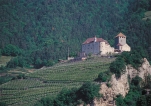(Eco) Logical Architecture of Walter Angonese

Walter Angonese is one of those architects who is guided by the fundamental principles, rather than follows passing architectural trends. He was born in the commune of Caldaro in South Tyrol in 1961, and graduated from the University of Architecture in Venice in 1990 and returned to South Tyrol, where in 2002 he opened his own office. Angonese has his own distinctive style, which origins stem from the amazing nature of this Italian province, where all speak ... German. His works are organically blended into the landscape of South Tyrol, which cultural identity was formed on the crossroad of the Mediterranean and Central Europe.
Mr. Agonese, you graduated from architectural university in Venice and studied there exactly at that time when leading Italian architects were teaching there. How it was to be taught by best of the best?
It was not like it is now: professors were not coming often, and basically we had consultations with their assistants. For example Aldo Rossi appeared maybe 5–6 times during semester – they were real “maestro” and did not behave the way we do now with our students when we teach them every week, coming to classes even from very far away. For me, a young man, it was certainly a beautiful experience. At that time I did not fully realize the importance of Aldo Rossi. Of course, it was obvious that he is famous , but till the end I did not understand his significance. Step by step, this understanding was coming.
Aldo Rossi was a very nice person, as well as Gregotti and Gino Valle and Manfredo Tafuri – the great theorist, and other professors with whom I had an opportunity to study-they were all very interesting people. There was no culture of close dialogue between student and professor simply because they were rarely coming to the university sometimes being out of it for few weeks, sometimes for a month.
The school was big enough, with large number of students. Surprisingly in classroom during lectures of Aldo Rossi were not many people, as it seems to me it was because of total lack of understanding in Italy with whom they are dealing. Actually, for me Venice period was beautiful – I liked the school and the city. The university was not concentrated on one place, and had 3–4 additional departments between which we had to move constantly, which was also not bad as we could better learn the city.
Full content of this issue you can read here
The full version of the article can be read in our printed issue, also you can subscribe to the web-version of the magazine
 Interviewed by Elizaveta Klepanova
Interviewed by Elizaveta Klepanova
Illustrative Materials Provided by Angonese Walter Architekt


